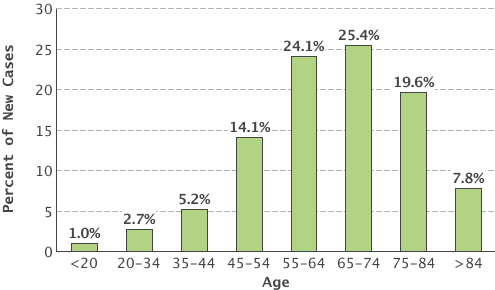
หน้าหลัก | สุขภาพดี | สุภาพสตรี | การแปลผลเลือด | โรคต่างๆ | ยารักษาโรค |วัคซีน | อาหารเพื่อสุขภาพ
Age
อายุ: ปัจจัยเสี่ยงที่ใหญ่ที่สุดสำหรับโรคมะเร็ง
แม้ว่ามะเร็งสามารถเกิดขึ้นได้ทุกช่วงอายุ แต่ความเสี่ยงจะเพิ่มขึ้นอย่างมากเมื่อเราอายุมากขึ้นที่จริงแล้วอายุเป็นปัจจัยเสี่ยงที่สำคัญที่สุดประการเดียวสำหรับโรคมะเร็งส่วนใหญ่
ทำไมอายุถึงมีความสำคัญ?
มีเหตุผลบางประการที่ทำให้อายุที่มากขึ้นเพิ่มโอกาสที่จะเป็นมะเร็ง:
-
ความเสียหายของเซลล์สะสม:
- เมื่อเวลาผ่านไปเซลล์ของเราต้องเผชิญกับปัจจัยที่เป็นอันตรายต่างๆ เช่น สารพิษการแผ่รังสีและข้อผิดพลาดระหว่างการแบ่งเซลล์
- แม้ว่าร่างกายของเราจะมีกลไกในการซ่อมแซม แต่ความเสียหายบางส่วนก็สามารถสะสมเป็นเวลาหลายปีได้
- การเปลี่ยนแปลงที่สะสมใน DNA เหล่านี้สามารถเพิ่มความเสี่ยงที่เซลล์จะกลายเป็นมะเร็งได้
-
ระบบภูมิคุ้มกันอ่อนแอ:
- ระบบภูมิคุ้มกันมีบทบาทสำคัญในการระบุและกำจัดเซลล์ที่ผิดปกติรวมถึงเซลล์ที่อาจกลายเป็นมะเร็งด้วย
- เมื่อเราอายุมากขึ้นระบบภูมิคุ้มกันของเราจะอ่อนแอลงตามธรรมชาติ ทำให้มีประสิทธิภาพน้อยลงในการตรวจหาและทำลายเซลล์มะเร็งที่อาจเกิดขึ้น
-
การสัมผัสกับสารก่อมะเร็งนานขึ้น:
- ยิ่งเรามีชีวิตอยู่นานเท่าไรเราก็ยิ่งต้องเผชิญกับสารก่อมะเร็ง (สารที่ก่อให้เกิดมะเร็ง) ในสิ่งแวดล้อมมากขึ้นเท่านั้นผ่านการรับประทานอาหารของเราหรือทางเลือกในการดำเนินชีวิต เช่น การสูบบุหรี่
- การสัมผัสสะสมนี้จะเพิ่มโอกาสที่เซลล์จะเกิดการเปลี่ยนแปลงที่เป็นอันตรายซึ่งนำไปสู่มะเร็ง
-
การเปลี่ยนแปลงระดับฮอร์โมน:
- ฮอร์โมนมีบทบาทในการเจริญเติบโตและการควบคุมของเซลล์
- การสูงวัยอาจทำให้ระดับฮอร์โมนเปลี่ยนแปลงซึ่งอาจส่งผลต่อการพัฒนาของมะเร็งบางชนิดเช่น มะเร็งเต้านมและมะเร็งต่อมลูกหมาก
ทำความเข้าใจกับความเสี่ยงของคุณ
- มะเร็งส่วนใหญ่ได้รับการวินิจฉัยหลังอายุ 55 ปี: แม้ว่าความเสี่ยงจะเพิ่มขึ้นตามอายุ แต่สิ่งสำคัญคือต้องจำไว้ว่ามะเร็งส่วนใหญ่ได้รับการวินิจฉัยในผู้ที่มีอายุ 55 ปีขึ้นไป
- ประวัติครอบครัวมีความสำคัญ: ประวัติครอบครัวเป็นมะเร็งสามารถเพิ่มความเสี่ยงได้ไม่ว่าคุณจะอายุเท่าใดก็ตาม
คุณทำอะไรได้บ้าง?
- การตรวจคัดกรองเป็นประจำ: การตรวจหาตั้งแต่เนิ่นๆเป็นสิ่งสำคัญพูดคุยกับแพทย์ของคุณเกี่ยวกับการคัดกรองที่แนะนำ โดยพิจารณาจากอายุและปัจจัยเสี่ยงของคุณ
- วิถีการดำเนินชีวิตที่มีสุขภาพดี: การรักษาน้ำหนักให้ดีต่อสุขภาพการรับประทานอาหารที่สมดุลซึ่งอุดมไปด้วยผัก และผลไม้และการออกกำลังกายเป็นประจำสามารถช่วยลดความเสี่ยงโดยรวมได้
- หลีกเลี่ยงการสูบบุหรี่และจำกัดเครื่องดื่มแอลกอฮอล์:สิ่งเหล่านี้เป็นปัจจัยเสี่ยงที่สำคัญของโรคมะเร็งหลายชนิด
- ป้องกันตัวเองจากแสงแดด:สวมครีมกันแดดหลีกเลี่ยงการอาบแดดเตียงและแสวงหาร่มเงาในช่วงเวลาเร่งด่วน
การสูงวัยเป็นสิ่งที่หลีกเลี่ยงไม่ได้ แต่การดำเนินขั้นตอนเชิงรุกเพื่อรักษาสุขภาพของคุณสามารถช่วยลดความเสี่ยง และรับประกันชีวิตที่สดใสเมื่อคุณอายุมากขึ้น
โปรดแจ้งให้เราทราบหากคุณต้องการขยายส่วนเหล่านี้หรือมีคำขอเนื้อหาอื่นสำหรับเว็บไซต์ของคุณ
Advancing age is the most important risk factor for cancer overall, and for many individual cancer types. According to the most recent statistical data from NCI’s Surveillance, Epidemiology, and End Results program, the median age of a cancer diagnosis is 66 years. This means that half of cancer cases occur in people below this age and half in people above this age. One-quarter of new cancer cases are diagnosed in people aged 65 to 74.
A similar pattern is seen for many common cancer types. For example, the median age at diagnosis is 61 years for breast cancer, 68 years for colorectal cancer, 70 years for lung cancer, and 66 years for prostate cancer.
But the disease can occur at any age. For example, bone cancer is most frequently diagnosed among people under age 20, with more than one-fourth of cases occurring in this age group. And 10 percent of leukemias are diagnosed in children and adolescents under 20 years of age, whereas only 1 percent of cancer overall is diagnosed in that age group. Some types of cancer, such as neuroblastoma, are more common in children or adolescents than in adults.
Percent of New Cancers by Age Group: All Cancer Sites

SEER 18 2007-2011, All Races, Both Sexes

